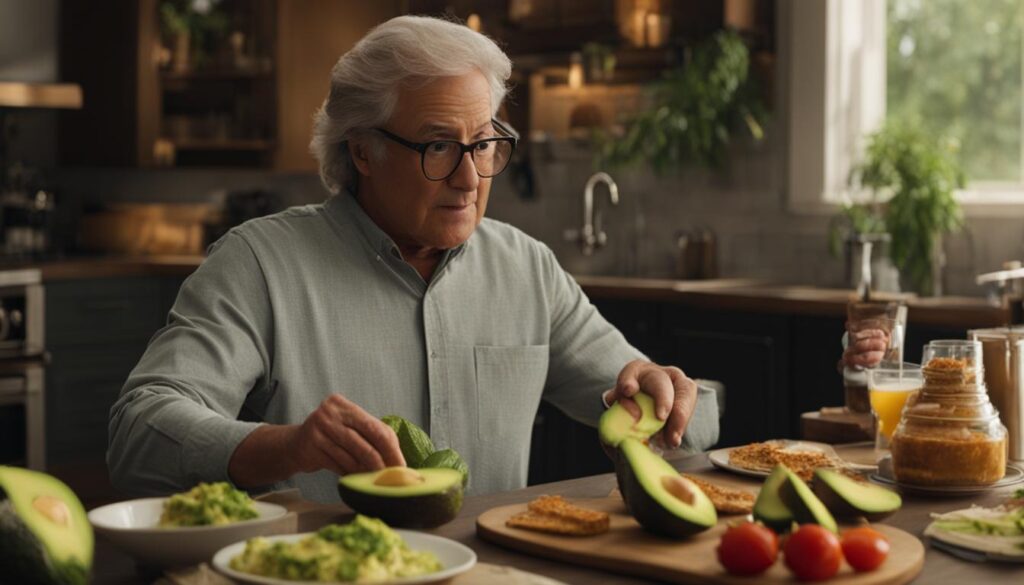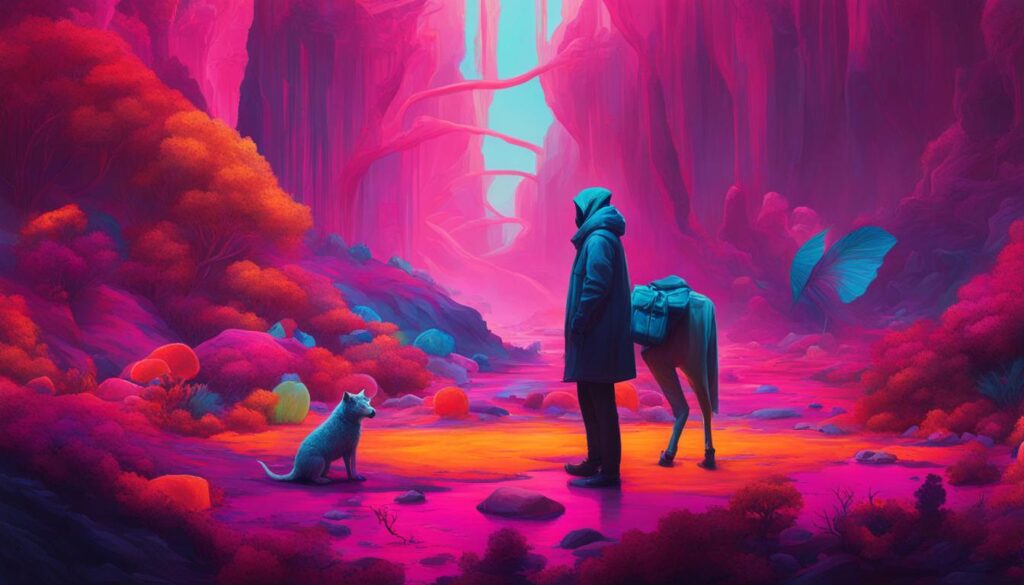Millennial humor has taken the world by storm with its unique and often perplexing style. If you’ve ever wondered why millennial humor is so weird, you’re not alone. In this article, we will explore the trends and factors that contribute to the bizarre and unexpected nature of millennial comedy.
Understanding millennial humor requires delving into the cultural influences and societal context that shape it. From the impact of social media and internet culture to the embrace of sarcasm and irony, there are many elements at play that contribute to this distinctive form of comedy.
So, why is millennial humor so weird? Let’s dive in and unpack the fascinating trends and insights behind this enigmatic comedy.
Key Takeaways:
- Millennial humor is characterized by its quirky and absurd nature.
- Social media and internet culture have heavily influenced millennial comedy.
- Sarcasm and irony play a significant role in millennial humor.
- Dark and absurd comedy allows millennials to process challenging emotions.
- Authenticity and relatability are valued in millennial humor.
The Influence of Social Media and Internet Culture
One of the key factors shaping millennial humor is the dominance of social media and internet culture in their lives. Millennials grew up in an era of rapid technological advancements, where platforms like Instagram, TikTok, and YouTube became central to their social interactions. These platforms have provided millennials with new ways to express themselves and share comedic content. The short-form, fast-paced nature of social media has influenced the style and delivery of millennial humor.
Millennials are adept at creating and consuming viral content that spreads across social media platforms. The rise of internet culture has nurtured a unique comedy ecosystem, where memes, viral challenges, and online trends shape the millennial comedy culture. Being constantly connected to the online world has allowed millennials to instantly access and participate in the latest comedic trends, fostering a shared cultural understanding of what is funny.
The visual nature of platforms like Instagram and TikTok has also influenced the aesthetics and presentation of millennial comedy. Short, attention-grabbing videos with punchy captions and visual effects have become the norm. Memes, combining images and clever captions, have become a popular form of millennial humor, allowing for quick and relatable comedic commentary.
The influence of social media and internet culture on millennial humor cannot be overstated. It has revolutionized the way comedy is created, consumed, and shared, allowing for a more diverse range of voices and perspectives to be heard. The democratization of comedic content through these platforms has given rise to a new era of comedy that is able to connect with and resonate with millennial audiences.
Embracing Sarcasm and Irony
Sarcasm and irony are at the core of millennial humor, and Generation Y has truly mastered the art of dry wit and clever wordplay. In their comedy, sarcasm serves as both a coping mechanism and a tool to shed light on the absurdities of life. Through irony, millennials skillfully highlight contradictions and satirize societal norms. This distinctive blend of sarcasm and irony allows millennials to craft jokes that subvert expectations and play with double meanings, creating a unique comedic experience.

Dark and Absurd Comedy
Millennial humor has an intriguing tendency to venture into the realm of the dark and absurd. This peculiar preference reflects the influence of the significant challenges and societal issues that this generation has been exposed to. In the face of adversity, millennials utilize humor as a tool to not only process difficult emotions but also to shed light on seemingly serious situations through wit and absurdity.
This unique aspect of their comedy allows millennials to break conventional boundaries and question the status quo. By finding humor in the darker aspects of life, they are able to navigate through challenging circumstances and cope with the overwhelming realities of the world in a distinct way.
The emphasis on dark and absurd comedy highlights the millennial generation’s ability to challenge norms and create a thought-provoking comedic experience. Through their unconventional style, they find solace in humor and deliver impactful messages that resonate with their audiences.
Embracing the absurd allows millennials to express their unconventional perspectives, challenge societal norms, and encourage critical thinking. This inclination toward dark and absurd humor has played a significant role in shaping the comedic landscape of this generation.

| Millennial Comedy Preferences |
|---|
| Quirky and offbeat |
| Dark humor |
| Absurd and surreal comedy |
| Subversive and satirical humor |
| Challenging conventional norms |
The Power of Realness and Authenticity
Authenticity is a key value for millennials, and this is reflected in their humor. They appreciate realness and reject the idea of presenting a perfect facade. Millennial comedians often share personal stories and vulnerabilities, creating a sense of relatability with their audience. By embracing imperfections and celebrating their quirks, millennials are able to foster a sense of community through humor.
When it comes to millennial comedy culture, there is a strong emphasis on genuine experiences and sincere connections. Millennial humor goes beyond mere punchlines to touch on deeply relatable topics. Comedians like Bo Burnham and Ali Wong have gained popularity by sharing their authentic stories and perspectives. They tackle issues such as relationships, mental health, and societal pressures, drawing laughter and empathy from their audiences.
This commitment to authenticity creates a safe space for millennials to express themselves and connect with others who share similar experiences. The realness in millennial humor opens up conversations about topics that were often considered taboo in previous generations. By shedding light on these subjects through comedy, millennials are challenging societal norms and helping to break down barriers.
Furthermore, the rise of social media platforms and online communities has provided millennials with a platform to share their authentic humor. Memes, viral videos, and comedic sketches populate platforms like Instagram, YouTube, and TikTok, allowing millennials to showcase their creativity and connect with a global audience. This democratization of comedy has given rise to new voices, styles, and perspectives in millennial comedy culture.
Through their humor, millennials are shaping a comedy culture that is unapologetically genuine and authentic. This not only reflects their values but also creates a space where individuals from diverse backgrounds and identities can find representation and feel understood. The power of realness and authenticity in millennial humor is undeniable, as it continues to resonate with audiences worldwide.
The Impact of Cultural Shifts and Identity Politics
Millennial humor is a reflection of the cultural shifts and the rise of identity politics in society. This generation uses comedy as a powerful tool to address social issues and challenge traditional power structures. With their unique humor traits, millennials fearlessly tackle sensitive topics like race, gender, and sexuality, pushing boundaries and sparking meaningful conversations. Their willingness to discuss and satirize these subjects sets millennial humor apart from previous generations.
The comedy landscape has evolved with the changing cultural dynamics, and millennials are at the forefront of this transformation. Through their humor, they shed light on the underlying biases and inequalities that persist in society. They utilize comedic platforms and mediums to amplify their voices and bring awareness to important issues.
By analyzing millennial humor, we can gain valuable insights into the cultural nuances and identity-driven perspectives that shape this generation’s comedic style. It provides us with a deeper understanding of the societal context in which millennials find themselves, and how they navigate and challenge prevailing norms through the power of laughter.
| Millennial Humor Traits | Analyzing Millennial Humor |
|---|---|
| Addressing social issues | Examining the impact of cultural shifts on humor |
| Tackling sensitive topics with satire | Exploring how identity politics shape comedic narratives |
| Challenging traditional power structures | Understanding the role of comedy in driving social change |
Conclusion
Millennial humor is undeniably weird, but it is a reflection of the times we live in. Influenced by social media, cultural shifts, and the unique traits of Generation Y, millennial humor stands out with its quirky, sarcastic, and dark undertones, while emphasizing authenticity. To truly understand millennial humor, we must consider the societal context and the diverse perspectives that shape it.
The dominance of social media and internet culture has been instrumental in shaping millennial comedy culture. Platforms like Instagram, TikTok, and YouTube have provided millennials with new ways to express themselves and deliver comedic content, influencing the style and delivery of their humor. The short-form nature and fast-paced environment of social media have encouraged millennials to be witty, creative, and concise in their jokes.
Moreover, millennial humor stands out because of its willingness to tackle sensitive subjects and address social issues. Comedy has become an important tool for millennials to challenge traditional power structures, spark conversations, and shed light on topics such as race, gender, and sexuality. This distinctive approach to humor sets millennials apart from previous generations and demonstrates their desire to make a difference through laughter.
As we unpack the underlying factors influencing millennial humor, we gain a deeper appreciation for its quirks and trends. It is in the weirdness, sarcasm, dark undertones, and authenticity of millennial humor that we find a reflection of the complexities of their generation. By embracing and understanding millennial humor, we can bridge the generation gap and appreciate the unique comedic lens through which millennials view the world.
FAQ
Why is millennial humor so weird?
Millennial humor is characterized by its quirky and often absurd nature, which sets it apart from previous generations’ humor. It reflects their cultural influences and societal context, including the dominance of social media and internet culture in their lives.
What are some trends in millennial humor?
Millennial humor trends include sarcasm, irony, dark undertones, and an emphasis on authenticity. Millennials use comedy to address social issues and challenge traditional power structures, sparking important conversations and pushing boundaries.
How do millennials embrace sarcasm and irony in their humor?
Millennials have developed a penchant for dry wit, clever wordplay, and using sarcasm as a coping mechanism. Irony is often employed to highlight contradictions and poke fun at societal norms. Subverting expectations and playing with double meanings are common techniques in their jokes.
Why does millennial humor tend to be dark and absurd?
Millennial humor reflects their exposure to significant challenges and societal issues. By finding humor in the darker aspects of life, millennials are able to process difficult emotions and question the status quo. The absurdity in their comedy allows them to challenge conventions and highlight contradictions.
How does authenticity play a role in millennial humor?
Authenticity is a key value for millennials, and it is reflected in their humor. They appreciate realness and reject the idea of presenting a perfect facade. Millennial comedians often share personal stories and vulnerabilities, creating a sense of relatability with their audience.
What impact do cultural shifts and identity politics have on millennial humor?
Millennial humor is influenced by cultural shifts and the rise of identity politics. Comedy has become a powerful tool for addressing social issues and challenging traditional power structures. Millennials use humor to tackle topics such as race, gender, and sexuality, often pushing boundaries and sparking important conversations.
How can we understand millennial humor better?
Understanding millennial humor requires acknowledging the societal context in which it exists and recognizing the diverse perspectives and experiences that shape it. By unpacking the underlying factors influencing millennial humor, we can gain a deeper appreciation for its quirks and trends.
